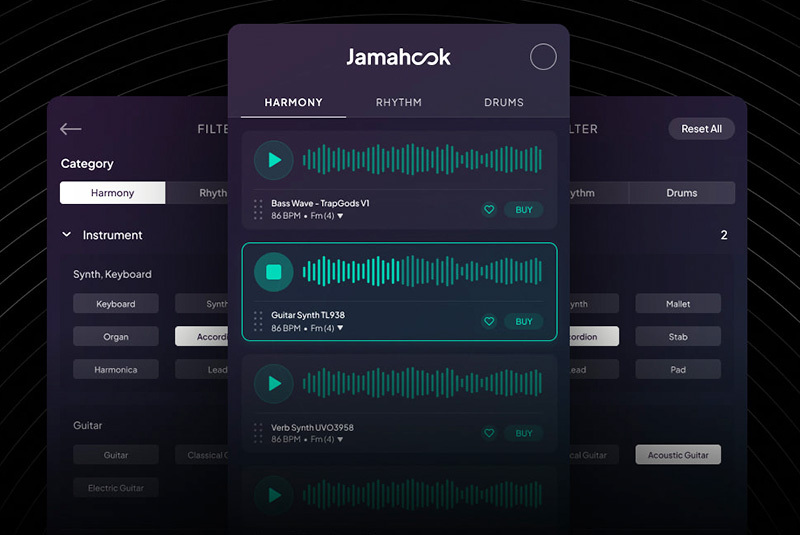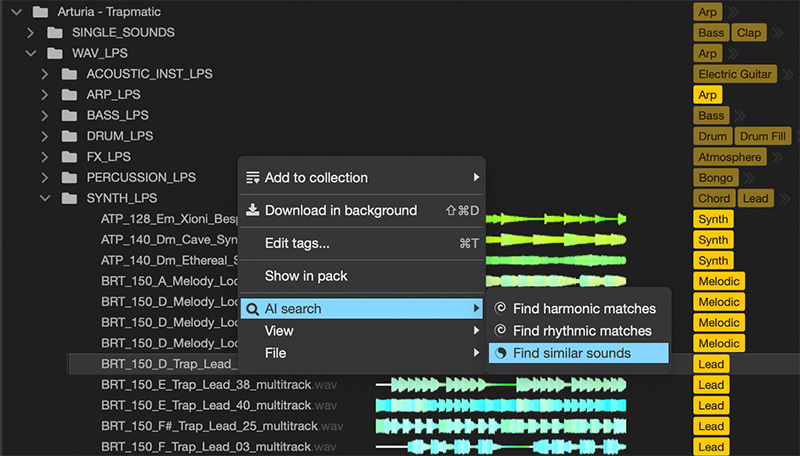Blog
10 AI Sites Musicians Need to Know About
14 Apr '2023
Find samples, generate MIDI and get extra inspiration with these ten intelligent places on the world wide web
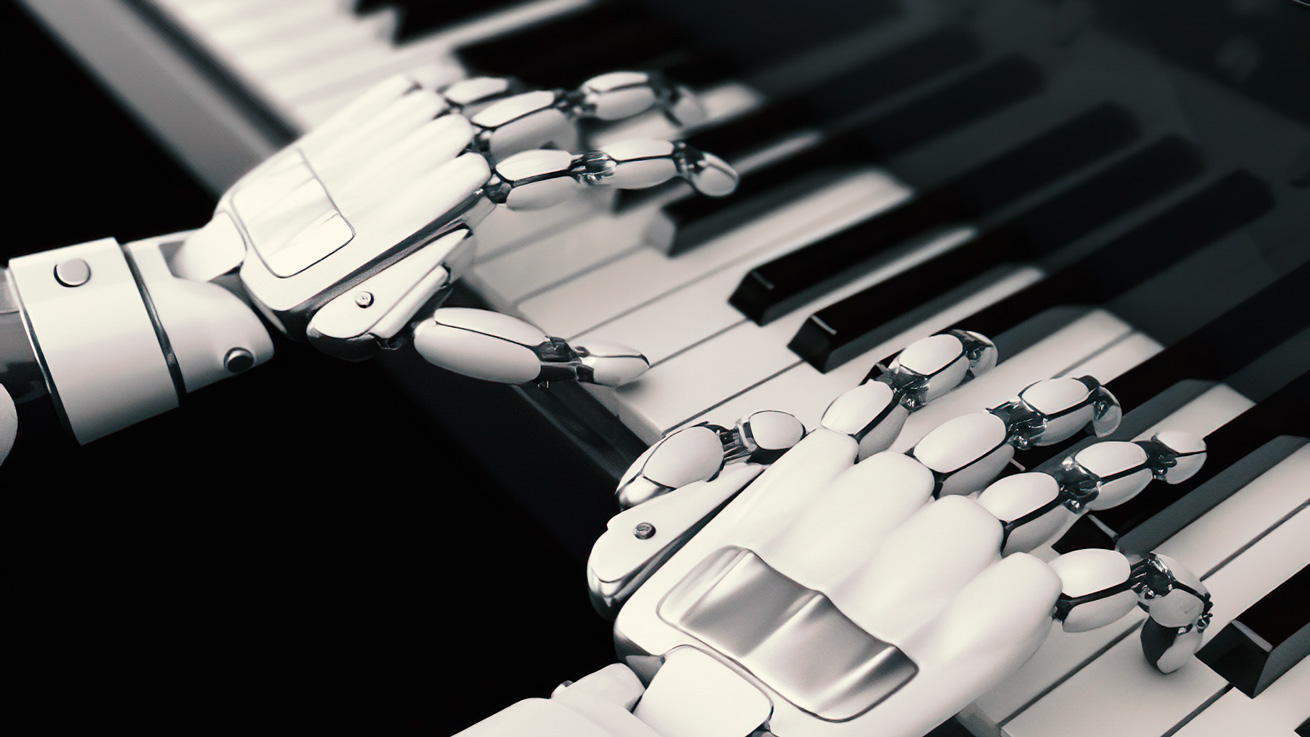
AI in the creative industries is currently at a bit of a crossroads. Though there are undoubtedly many exciting creative and technical possibilities opening up to musicians and other creatives as a result of new advances in AI technology, the idea of artificial intelligence replacing creative professionals is a very real fear.
It’s not just the idea of being replaced by artificial intelligence that threatens musicians, it’s also the potential copyright infringements that come about as a result of AI engines being trained on the works of other musicians.
Whatever your stance on AI-generated music, there’s still a lot to be said for AI being integrated into music production tools. Even we here at Loopcloud have jumped on the train, installing Jamahook AI sound matching into the Loopcloud platform to help suggest samples that will fit whatever track you’re working on.
In this list you’ll find ten websites that musicians need to know about. Some of them are useful tools to help you create something new, while some of them are just plain interesting, but either way, they’re worth checking out.
Our Top 10 AI Sites for Musicians
AIVA
AIVA is the only tool on this website that has been featured in a TED Talk. Trained on tens of thousands of compositions from great artists throughout history, AIVA has learnt how to build songs based on its understanding of these tracks.
You can use AIVA to build tracks in a multitude of genres. AIVA gives you the ability to pick key information, instruments, style of the instruments, tempo ranges and more and then generate up to five tracks using those prompts to give you a selection.
One really cool feature is that you can upload audio files of songs you’re inspired by as reference tracks for AIVA to use. You can even upload different tracks for different prompts. For example you can upload one reference track to determine the key and chords used in the song, and another track to influence how the drums sound.
Another awesome thing about AIVA is that it’s totally free to use and download tracks. You only need to pay if you want a commercial licence for any of the tracks you generate.
Google MusicLM
Google MusicLM isn’t a tool that the general public can currently use, but this research paper demonstrating the program’s capabilities is just a fascinating read and listen for anyone interested in the world of AI and music.
In the words of the researchers Google MuscLM is “a model generating high-fidelity music from text descriptions such as "a calming violin melody backed by a distorted guitar riff" […] and it generates music at 24 kHz that remains consistent over several minutes.”
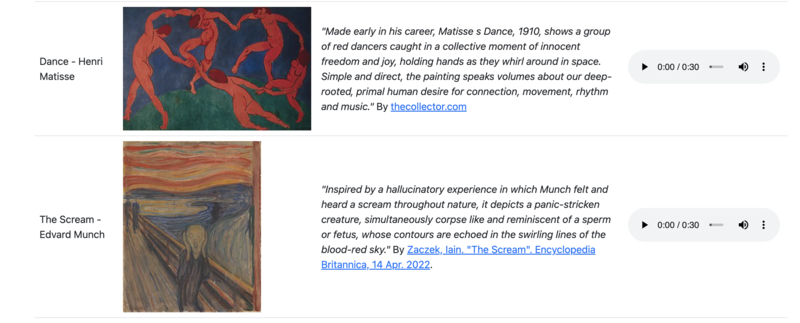
But MusicLM can generate music based on more than just text. The researchers also fed the algorithm classic works of art alongside text descriptions, and the resulting audio are eerily well suited to the corresponding artworks.
We particularly recommend listening to the audio corresponding to The Scream by Edvard Munch and Dance by Henri Matisse.
Musioo Tag
Musioo Tag is a great tool for DJs or casual music lovers who want to organise and tag their music library. Drag a song or paste a Soundcloud URL into the Musioo Tag site and it will analyse and generate tags for you.
This is cool for one track, but not really that useful. The real power of Musioo comes in when you want to tag a large music library.
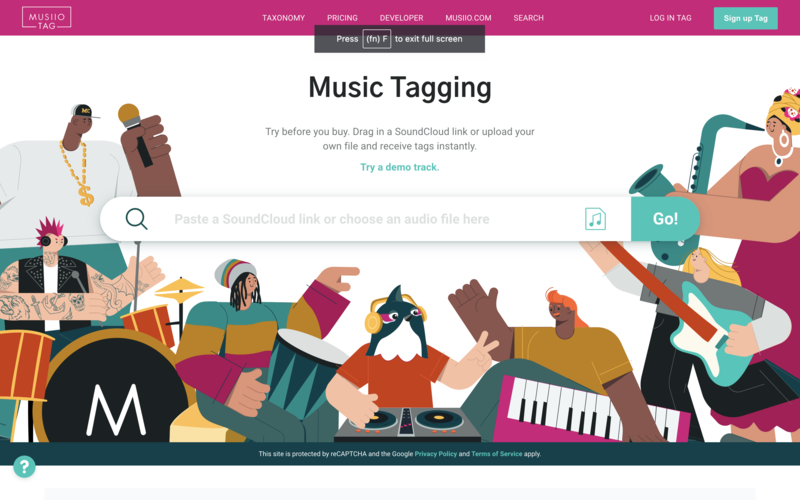
As Hazel Savage, CEO at Musiio is quoted on their website:
“If you want to tag one song, do it yourself, it will take ten minutes. If you want to tag 10,000 songs in one day, get AI to do it."
Audio Shake Indie
Stem separation has existed in the music production sphere for a while. It’s an interesting technology but it’s never sounded that great. Yeah tools like Izotope RX and Hit’n’Mix RipX are able to separate vocals, bass, drums and other musical instruments in a manner that would have seemed like something from a Dan Simmons novel 30 years ago, but the resulting separated stems would always suffer from unpleasant artefacts.
In addition, if you’re not a music producer the interfaces of the two programs are pretty hard to wrap your head around.
That’s where a tool like Audio Shake Indie comes in.
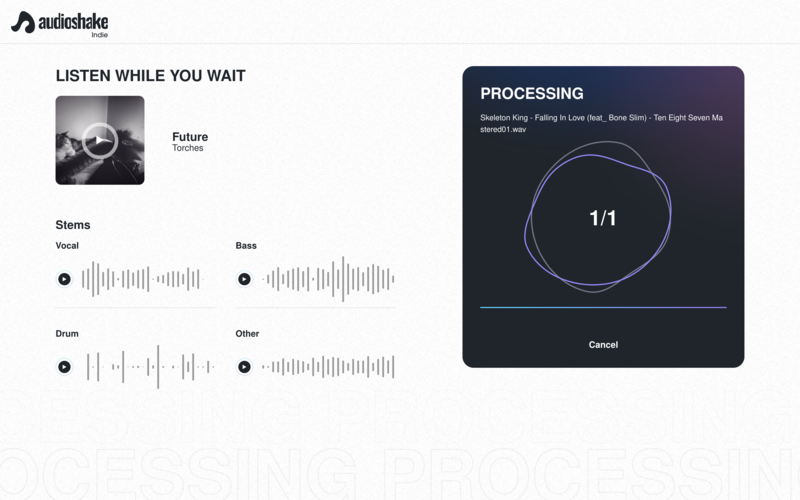
Designed for artists who want to separate existing tracks into stems in order to use them for sync licensing (AKA placement in TV and movies), Audio Shake Indie is not a tool for producers looking to rip the vocals from an Erykah Badu track for a dirty bootleg. In fact Audio Shake Indie will not let you separate a track that it detects contains copyrighted material.
Depending on your perspective this could be seen as a pro or a con, but it definitely does protect the intellectual property rights of musicians.
The stem separation is also fantastic, giving snappy drums and clean vocals without any of that digitally distorted fluff which often occurs as a result of stem separation. If you’re an artist looking to get into the potentially lucrative world of sync licensing this could be a great option
Jukebox
OpenAI is most famous for its text based AI engine ChatGPT (if you haven’t played around with that yet we highly recommend it), but they also have a music generation program called Jukebox that has the eerie ability to generate voices who sing like famous musicians.
Scroll down the Jukebox page on the OpenAI website and listen to “Rock, in the style of Elvis Presley”, “Pop, in the style of Katy Perry” and “Classic Pop, in the style of Frank Sinatra”.
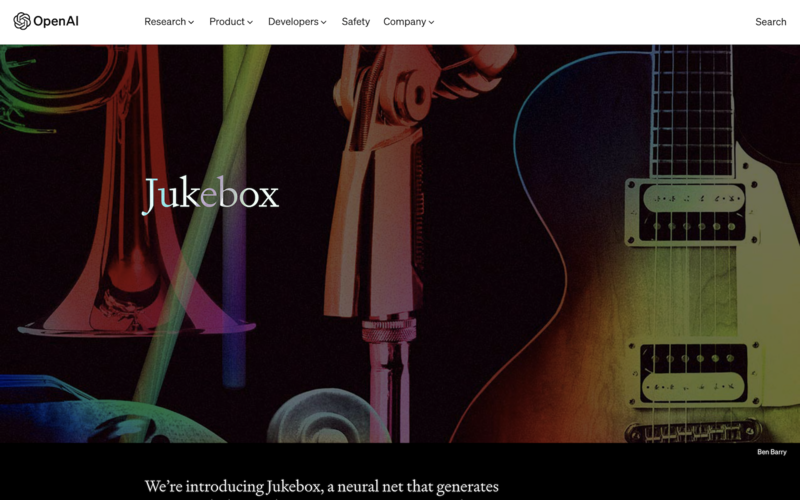
Though these voices do fall into the uncanny valley, they unquestionably have attributes of the real human singers they’re impersonating, and the backing tracks behind them also fit the artists in question.
Samplette
If you do fancy some illegal bootlegging then Samplette is the tool for you. This handy web based tool scours YouTube for tracks that are just ripe for flipping into hip hop or dance tracks.
Hit the shuffle button at the bottom of the web page and Samplette will serve you up classic tracks from throughout the decades. It will also save all the tracks you’ve gone through so far.
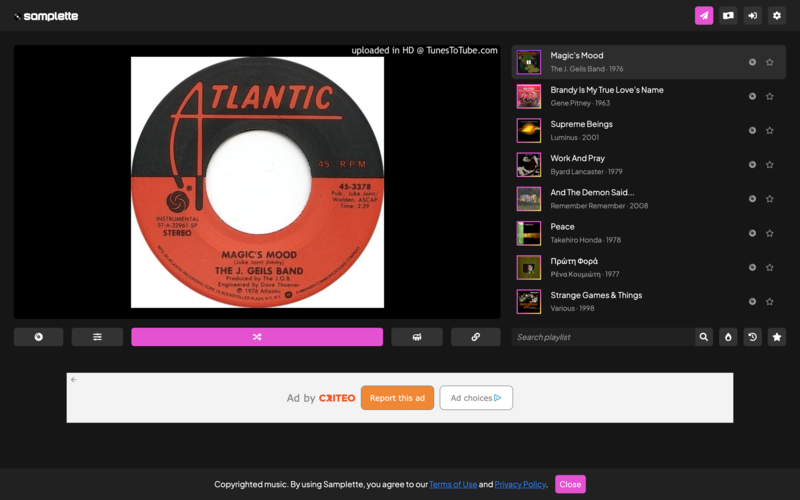
Each track that Samplette serves up has metadata such as Year, Key, Genre, Label and more. This is useful for reference, but it also means that you can filter the types of tracks that Samplette gives you.
Spend five minutes on this awesome sight and you’re sure to find something that inspires you.
Of course you won’t be able to commercially release any music you make using samples found on Samplette (unless you clear them) as they are not royalty free – that being said it’s great as a source of inspiration, or just for having fun.
If you are in need of royalty free samples then look no further than Loopcloud.
A.V Mapping
A.V Mapping isn’t really a tool for musicians. It’s more for filmmakers looking for music for their projects. However, where it is of interest to musicians is the fact that it provides a marketplace for songwriters to sell tracks for use in video projects.
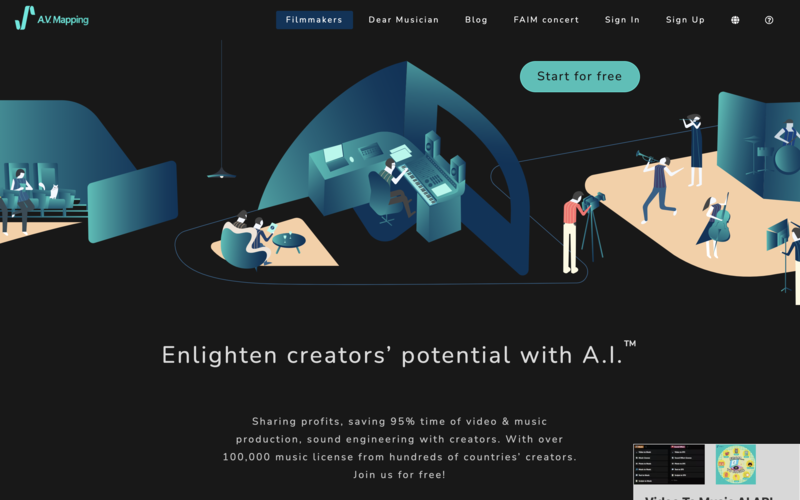
Theoretically the advantage of selling your work through A.V Mapping is that your music being placed shouldn’t rely on reputation or ranking high in the search results of a music library. Instead it should only depend on your music’s suitability for each individual project.
Riffusion
Another text based music generation tool, the advantage of Riffusion is its fun interface. Your text based prompts appear in an endless stream and you can click back in time to hear your previous creations.
The currently playing track appears as a three dimensional spectrogram on the left hand side of the site.
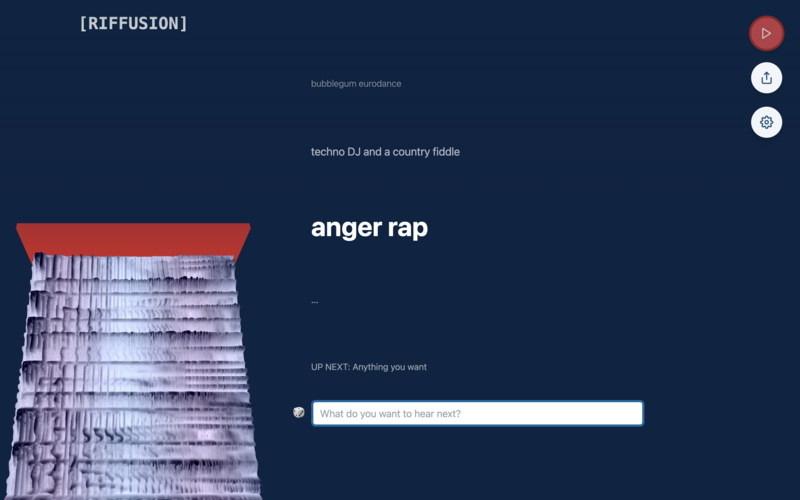
The songs that are produced are unmistakably not made by humans, you’d be hard-pressed to use a song produced on Riffusion in a commercial project. However, it’s a fun-to-use music generator that’s worth checking out for musicians interested in the possibilities of AI
Amper Music
Finally, if you just want to buy tracks for commercial use that have been produced by AI, Shutterstock now sells licences for music produced by AI music generator Amper Music.
Amper Music is much more prolific than your average human composer with over 100,000 tracks available to download. This, perhaps, is the more sinister side of AI based music production.
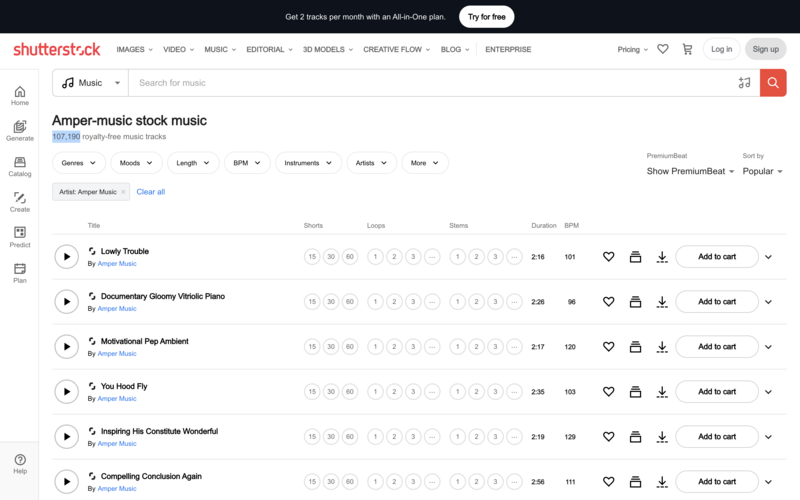
When it comes to listening to music for pleasure, humans will always enjoy listening to music created by other humans, but in the world of commercial content creation, AI based music could end up very quickly outpacing our own capacities.
Used Amped is usually cheaper than other sources, and the vast quantity of tracks that an AI can produce means that you’re very unlikely to use the same track as someone else in your videos.
Jamahook
Jamahook AI is an innovative tool that uses artificial intelligence to help musicians improve their skills and creativity. This powerful technology can analyze musical patterns and generate new ideas, making it an indispensable tool for any musician looking to take their craft to the next level.
One of the key benefits of Jamahook AI is its ability to help musicians generate new melodies and chord progressions. By analyzing existing music and identifying common patterns, the AI can generate new musical ideas that are both original and musically sound. This can be incredibly helpful for musicians who are struggling to come up with new ideas or are looking to break out of creative ruts.
Another way that Jamahook AI can be useful for musicians is by helping them analyze and improve their playing. By analyzing recordings of performances, the AI can identify areas where the musician needs to improve, such as timing or pitch accuracy. This can be incredibly valuable for musicians who are looking to hone their skills and take their playing to the next level.
One of the exciting developments in the world of music production is the integration of Jamahook AI technology into Loopcloud. Loopcloud now offers a new feature called "Inspiration" that uses the AI to suggest samples based on the user's preferences and search history. This feature can help musicians discover new sounds and ideas that they might not have otherwise found.
In addition to suggesting samples, Jamahook AI can also analyze the key and tempo of samples, making it easier for musicians to find samples that fit together harmonically and rhythmically. This can save musicians a lot of time and effort in the process of finding and matching samples.
Overall, the integration of Jamahook AI technology into Loopcloud is a game-changer for musicians looking to streamline their workflow and discover new ideas.
FAQs
What percentage of musicians use AI?
AI’s presence in the music industry has grown rapidly in recent years. New research has found that almost 60% of musicians surveyed are using the technology to make music.
People often forget that AI has been a part of music software and DAWs for a long time. Processes such as audio time stretching often use AI algorithms to process the complex maths involved.
How are musicians using AI?
The integration of AI into music has revolutionised the way music gets made by assisting with song composition, mixing and mastering, and even instrumental and vocal reproduction.
What are the advantages of AI in music?
AI can be used by musicians for more extremely technical tasks, such as complex vocal pitching and stem splitting. Using AI allows this work to be done at a much cheaper and faster rate.
